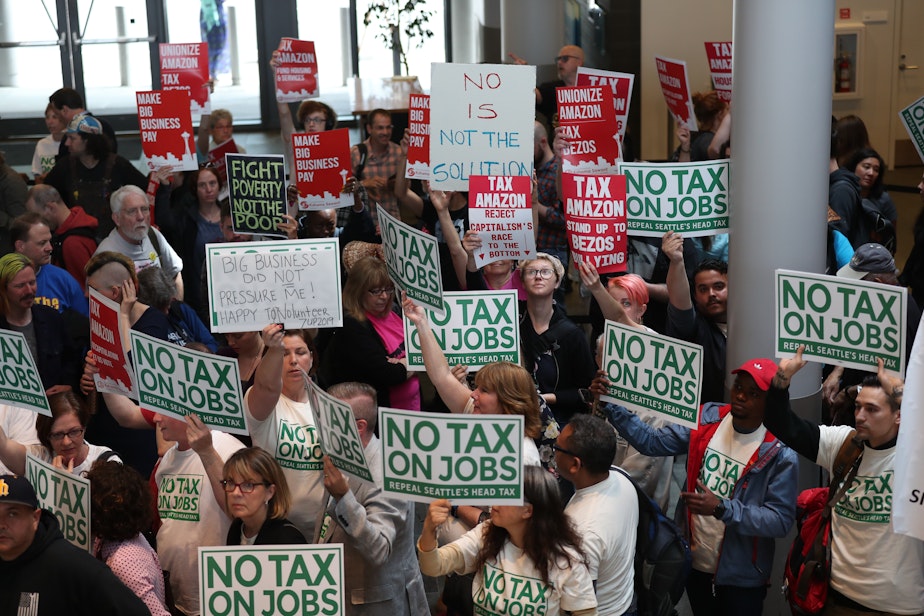Amazon to Seattle: Go ahead and tax us over homelessness

Eleven major Seattle-area companies say they are willing to be taxed to help address regional challenges, such as affordable housing, mental health, and public safety.
The companies -- including Amazon, Microsoft, Starbucks, and Alaska Airlines – signed a statement released Tuesday, saying: “We think the most high impact way to contribute to meet those needs is in the form of a new business tax."
The statement comes as state lawmakers consider a bill that would allow King County to tax large businesses with high earners to help address homelessness in the region.
In the statement, the eleven employers stop short of supporting the proposed measure. Instead, the statement says any tax should be “imposed at a reasonable level with accountability for results in homelessness and affordable housing.”
Two years ago, a proposed tax on employment in Seattle aimed to generate funds for homelessness. But it drew the ire of some of the same companies on this list. In the fiery “head tax” debate that followed, Amazon said it would halt construction on one tower in Seattle and opt not to move into another because of the tax.
Even though the city withdrew the tax, Amazon followed through on part of its threat. Starbucks and other tech firms also heavily criticized that proposal at the time.
Sponsored
But this time appears to be much different.
The employers’ statement comes in a new context. Seattle city council member Kshama Sawant, re-elected last fall in an election that routed candidates supported by Amazon, began the year saying she would pursue a tax on Amazon this year.
Seattle mayor Jenny Durkan went on the record saying she progressive business tax would happen in 2020 - though it was not clear whether this would be a city, regional or state tax.
In the statement today, the businesses stated their preference: They want to see any legislation “include a regional approach to address a regional issue.”
And that approach appeared to be in harmony with what other organizations are looking for. More than a dozen unions signed a letter saying they were pleased regional employers are willing to engage in civic dialogue on the subject of taxes.
Sponsored
“Our affordable housing and homelessness crisis is a regional problem and it needs a regional solution,” it reads.
In addition, dozens of other individuals and community groups signed onto a letter to the state House Finance committee chair, Gael Tarleton, urging the state Legislature to support the current bill “to give our region this important local tool to address our homelessness crisis.”
Sponsored
Consternation and opposition are also part of the debate over the proposed tax legislation, however. At a public hearing today, some officials from suburban cities in King County expressed frustration that they had not been consulted in the drafting of the legislation.
Auburn mayor Nancy Backus said she could neither support nor oppose the measure at this point.
"When you're talking about local electeds, there was no one outside of Seattle that we are aware of that was consulted on this and now we're left to scramble to determine what effect this will have on our community," Backus said. “Since we were not initially there, our cities are now in the worst position possible.”
The Association of Washington Business also expressed concerns.
“We should not hinder our competitive advantages at a time when so many businesses are fleeing other states and seeking more business-friendly climates,” said Tommy Gantz, director of tax and fiscal policy for the association.
Sponsored
“This bill is a slippery slope of legislation and it will not take long before it extends across the state with the dollar threshold dropping, capturing more employers,” Gantz said.
Another issue raised during recent public comment in Olympia was whether or not the proposal should include a clause preventing cities from enacting their own additional tax. This is something some Seattle City Council members have indicated they would oppose. It’s sure to be a part of the ongoing discussions.




